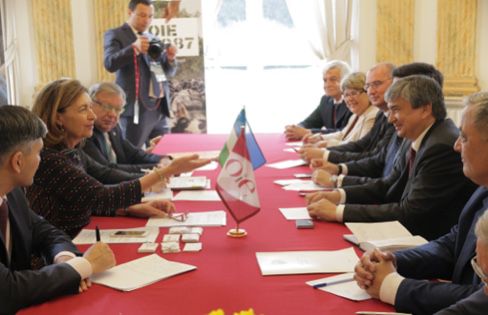Dr. Eloit: Uzbekistan has been a Member of WOAH for thirty years, and the efforts of the country to comply with WOAH’s recommendations have always been steady. Yet it is worth noting that the involvement of the Uzbek veterinary sector in our activities has escalated in recent years.
In 2017, shortly after the Veterinary Services of Uzbekistan became an independent Committee of ministerial status, I visited the country to sign an official “Agreement on cooperation in the field of veterinary public health” between WOAH and the Government of the Republic of Uzbekistan”. Since then, new initiatives have kept developing.
In particular, between 2017 and 2019, four missions were conducted by independent WOAH experts in the framework of the PVS (Performance of Veterinary Services) Pathway, at the request of the Uzbek authorities. This is a great achievement in such a short period of time. These missions aimed to analyse the capacity of the national Veterinary Services and then to identify and assess the financial cost of potential solutions to address the challenges faced by the country to efficiently implement WOAH Standards (PVS Evaluation and PVS GAP Analysis missions). With a better understanding of the national context, our experts were then able to propose additional missions in support of a specific domain, namely, a PVS legislation mission to support the development of adequate national legislation with regard to veterinary public health and a PVS Laboratory mission, to help strengthen the veterinary laboratory infrastructure within the country.
The findings of these missions provide the country with concrete needs and perspectives to strengthen the Veterinary Services and develop the livestock sector. Thus, the mission reports provide support to the discussions with potential donors and international financial institutions regarding requests for grants and loans.
Dr. Eloit: Currently, WOAH’s programmes are supporting the national Veterinary Services of Uzbekistan in two main domains: Veterinary education and Veterinary legislation.
A Veterinary Education Establishment (VEE) Twinning Project is being conducted between the University of Minnesota College of Veterinary Medicine (United States of America) and the Samarkand Veterinary Medicine Institute, which is under the system of the State Veterinary Committee. Funded by the United States Defense Threat Reduction Agency (DTRA), this project aims at sharing competencies across the two establishments and helping bring the quality of veterinary education in Uzbekistan to internationally recognised standards. Within the framework of the project, professors and teachers from Uzbekistan are improving their skills, and the national teaching curriculum for veterinary students is being revised in accordance with WOAH “Day 1 graduates” Competence and Veterinary Education Core Curriculum.
In addition, together with the Veterinary Services of Uzbekistan, we implemented the first stage of the Veterinary Legislation Support Project (VLSP) in 2019-2021. Significant progress has been made to align the veterinary legislation of Uzbekistan with WOAH International Standards. The project has also allowed identifying priorities for future works: a second phase is expected to be conducted, once further funding will be available.
Dr. Eloit: I have observed a significant evolution in the capacity of your national Veterinary Services in recent years. The veterinary sector is now much better structured to address the needs of the country in terms of animal health and welfare, thanks to several successful reforms which have been carried out in the last five years. The country is now better equipped to effectively implement WOAH International Standards.
I encourage Uzbekistan to share its experience in strengthening the capacity of its Veterinary Services and explain how this has contributed to better improve animal health and welfare in the country. Beyond this, Veterinary Services have managed to enlarge their footprint and play a critical role in improving food safety, the economy of the country as well as human health. I hope that these positive dynamics will continue to thrive.
I would also like to acknowledge the efforts of the President of Uzbekistan to support the development of the veterinary sector at the national level and to consider it a priority.
Dr. Eloit: Much has been done over the past years but as mentioned above, some priorities have been identified to further improve the performance of the Veterinary Services in Uzbekistan. It is important that the country continues to strive to address remaining gaps and keeps its level of engagement in WOAH’s activities.
Some key aspects are the further development of science in the field, the training of young personnel, as well as the involvement of more specialists with international experience in the field.
I am convinced that the next Conference of WOAH Regional Commission for Europe that will be held in Uzbekistan in September 2024 will give us a welcome opportunity to acknowledge the progress with all WOAH Members of the region.
